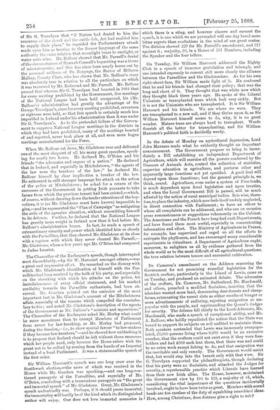In the debate of Monday on agricultural depression, Lord John
Manners made what he evidently thought an important announcement. The Government propose to bring in imme- diately a Bill establishing an independent Department of Agriculture, which will exercise all the powers conferred by the Diseases of Animals Acts, control the collection of statistics, supervise education in agriculture, and perform other and apparently large functions not yet specified. A good deal will depend upon those functions ; but the general principle is, we think, sound. Agriculture, even under a system of Free-trade, is much dependent upon fiscal legislation and upon treaties, and when the Local Government Bill is passed, will be much affected by the action of rural municipal bodies. It is wise, there- fore, to place the industry, which now feels itself unduly neglected, in direct connection with Parliament ; to have an officer to whom all complaints can be addressed, and who can on occasion press remonstrances or suggestions vehemently on the Cabinet. The Americans and the French have long had such Departments, and have found them most useful, especially in concentrating information and effort. The Ministry of Agriculture in France, for example, has supervised and urged on all the efforts to extirpate the phylloxera, and has encouraged many considerable experiments in viticulture. A Department of Agriculture ought, moreover, to enlighten us all by evidence gathered from the whole world as to the most difficult of all agricultural questions, the true relation between tenure and successful cultivation.






































 Previous page
Previous page